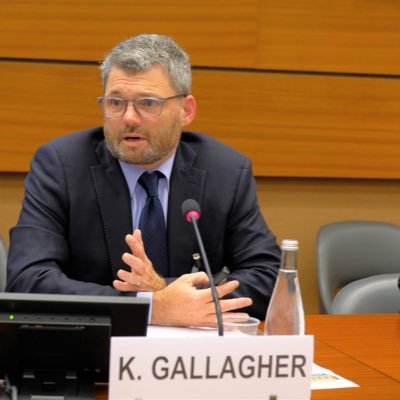Experts at the Global Development Policy Center have outlined top policy priorities of the moment for the G20 ahead of its summit in Riyadh, Saudi Arabia this week from November 21 through 22.
The Center is concerned with advancing policy-oriented research for financial stability, human well-being, and environmental sustainability.
To fulfill its mission, it conducts rigorous policy research; provide a convening place for scholars and stakeholders; engage in policy dialogue with policy-makers, civil society, and media; and offer experiential learning for Boston University students.
Below are recommendations related to trade agreements, bond purchases, IMF austerity, strengthening the global financial safety net, climate change, and more:
For the Director of the Center, Dr. Kevin P. Gallagher, G20 Needs to Reset Multilateralism.
As the COVID-19 pandemic rages into a second wave and new lockdowns threaten the world economy, the G20 needs to lead.
In April, the G20 was right to establish the Debt Service Suspension Initiative (DSSI) that now suspends debt payments for the world’s poorest countries through mid-July 2021.
When the G20 made these first gestures, the International Monetary Fund (IMF) predicted emerging market and developing countries (EMDs) would contract by 2.3 percent in 2020.
In April, the IMF predicted a 3.7 contraction in 2020. As the situation has worsened, the IMF now sees EMDs as contracting by 5.7 percent in 2020.
The World Bank adds that upwards of 150 million people worldwide will be pushed into extreme poverty as a result of the crisis by the end of 2020 – with eight out of ten of those people in middle income countries.
What is more, 2020 is already the second warmest year on record. Cyclones and hurricanes, wildfires, and drought have ravaged economies and livelihoods already pushed to their limits.
As these factors compound, capital continues to flee from many EMDs, putting downward pressure on exchange rates, and ballooning debt levels.
As an indicator of the looming systemic debt crisis, there have already been more EMD credit rating downgrades in 2020 than in all previous crises over the past 40 years.
A looming debt crisis is on the horizon. The G20 needs to renew calls for an ambitious new allocation of Special Drawing Rights (SDRs) at the IMF, new capital increases at development finance institutions, and expand the DSSI beyond suspension to actual debt relief.
In so doing, the world community needs to agree that the new fiscal space from such action be aligned with measures that combat the virus, protect the vulnerable, and mount a green and inclusive recovery.
If intransigence prevails once again, President-elect of the United States Joseph Biden should call for an emergency G20 meeting in early 2021 to reset the multilateral effort to move forward.
Non-Resident Senior Fellow, GEGI, Robert N McCauley, wants G20 to add up bond purchases by Central Banks across the global bond market.
According to him, in March 2020 the Federal Reserve announced for the first time that it would buy US corporate bonds. Market prices for the investment grade bonds to be purchased rose smartly, but so did prices for junk bonds, although only in April did the Fed announce that it would buy some.
Dollar bonds of emerging market issuers also seemed to respond to the announcement in March, although the Fed has not bought any.
These observations give evidence once again that in buying bonds in large scale, central banks pursuing national mandates move bond markets globally. In particular, prices of the dollar bonds of emerging market issuers are linked to those of US corporate bonds through substitution in investors’ portfolios. And the prices of dollar bonds of emerging market issuers are in turn linked to the prices of their domestic currency bonds.
The staff of the IMF in its November G20 Report on strong, sustainable, balanced and inclusive growth summarizes the bond market interventions by country-by-country central bank balance sheet expansion.
It usefully shows balance sheet expansion this year in G20 emerging markets, Brazil, India, Mexico, Russia, South Africa and Turkey, as well as in advanced economies.
Granted, it is not easy work to go beyond such a measure to take into account the duration and credit risk of central bank purchases. But at a minimum, the G20 needs an assessment of the scale of the larger footprint of G20 central banks in the global bond market as a whole.
Professor of International Political Economy, Perry Mehrling, is arguing that in war time, control of money shifts from the central bank to the Treasury, as a way of prioritizing war finance needs.
In COVID-19 time, G20 central banks have accommodated Treasury borrowing needs, with the US Federal Reserve setting the pace.
But now, as the prospect of an effective vaccine emerges on the horizon, the time has come to begin planning for post-COVID-19 time.
Not only federal but also state and local, not only public but also private household and business balance sheets have been hollowed out by the crisis, and there is a real threat that widespread debt overhang will delay recovery, and indeed also the necessary reconstruction.
The time of forbearance and debt moratorium is coming to an end, and the day of reckoning looms.
The problem looking forward is therefore not liquidity but solvency, a problem of debt restructuring. Easy money and low interest rates merely push the day of reckoning into the future, but the essential thing now is to get that day into the past in order to begin the task of rebuilding.
It is not something for central banks, rather something for bankruptcy courts, and perhaps an updated Reconstruction Finance Corporation.
In 1938, the Twentieth Century Fund published a study by Albert Gailord Hart, Debts and Recovery, a Study of Changes in the Internal Debt Structure from 1929 to 1937 and A Program for the Future. An updated version of that study, for each country in the G20, is the necessary factual basis for our own program for the future.
Non-Resident Senior Research Scholar, Sandra Polaski, is pushing for G20 to adopt coordinated policies to increase employment and wages, reverse growing inequality and aggressively address poverty.
Her argument, when the political backlash against globalization erupted in recent years, the G20 was seen by many as part of the out-of-touch elite. It failed to address the economic difficulty suffered by many households in G20 countries due to corporate-oriented trade and globalization policies.
The G20 had only one real accomplishment to boast of: the coordinated economic stimulus it undertook in 2008-2009 to stabilise the global economy. However, a number of G20 countries then erroneously reversed course to business-as-usual, leading to weak recovery, entrenched unemployment and wage stagnation.
Many G20 countries were still digging out when the coronavirus hit and again devastated labor markets. If the G20 group is to regain its relevance, it must adopt coordinated policies to increase employment and wages, reverse growing inequality and aggressively address poverty.
Here are two practical examples of such policies. First, agree to a coordinated increase in minimum wages across the G20 to provide direct support to low-wage workers and increase domestic demand. If implemented by these huge economies, this would also provide serious stimulus to global demand and avoid damaging wage competition among G20 members.
The second is a G20-wide commitment to launch public employment programs. Such programs helped countries during the Depression and are needed again. India has an outstanding contemporary example in its National Rural Employment Guarantee and the US and other countries will certainly need public employment creation to overcome the harsh and uneven employment losses from the pandemic.
A well-advertised, coordinated effort including policies such as these could demonstrate the relevance of the G20 to populations that have benefited little from the group’s efforts to date.
Another non-resident senior research scholar, Jeronim Capaldo, wants G20 to set better development-minded standards for trade negotiations, stressing that international trade can be a driver of powerful change, but trade treaties often make it work in reverse, supporting large corporations at the expense of smaller enterprises, constraining governments’ autonomy and driving up inequality.
The G20 can change that by setting better standards for trade negotiations by reforming the World Trade Organisation (WTO) as a development-focused negotiating forum and by abstaining from trade deals that reduce policy space.
Trade supports economic development by expanding aggregate demand – leading to better division of labor, economies of scale and innovation – and providing precious foreign exchange, necessary to purchase capital goods from abroad. In this sense, trade is critical for industrialisation in developing economies and compatible with full employment in developed ones.
But recent trade deals (e.g. NAFTA, CPTPP, TTIP, CETA, CFTA etc.) can derail domestic economic agendas as they force regulatory changes on governments in areas as diverse as investment, finance, intellectual property, health, labour and environmental standards.
For many governments, this means losing control over industrial policy, public investment, financial regulation and other critical policy areas. Ultimately, these un-equalising deals curtail trade growth by weakening participating economies.
A more sensible approach is to negotiate agreements that deal exclusively with trade provisions, mainly tariffs, subsidies, quotas and preferential purchases, leaving investment and finance to separate agreements.
And to better protect weaker countries and make sure that trade expansion is sustainable for the world economy, negotiations should take place within a multilateral framework that recognizes the importance of policy autonomy for development and structural change.
By committing to reforming the WTO as a development-focused negotiating forum and abstaining from all-encompassing plurilateral deals that reduce policy space, the G20 can make a difference.
The Center’s Assistant Director, William N. Kring, says COVID-19 has wreaked havoc on the global economy with the harshest effects of this crisis being felt in emerging market and developing economies.
The World Bank warns that global extreme poverty is predicted to increase for the first time in two decades and that up to 150 million people could fall into extreme poverty by 2021.
The economic effects of COVID-19 highlight the critical importance for the global economy to have a robust and inclusive global financial safety net (GFSN).
Recent research by the Global Development Policy Center on the GFSN finds that facilities for liquidity provision and crisis finance have increased tenfold since the 2007-8 financial crisis.
At present, the GFSN is a complex institutional landscape with a lending capacity of $3.5 trillion, of which $2.5 trillion is designated for advanced economies. Thus, the GFSN does not meet the requirements to tackle financial needs of emerging market and developing economies due to COVID-19.
To rise to the task of COVID-19, the G20 must commit to leveraging all available resources to mitigate the economic effects of COVID-19 across the globe; commit to expanding the coverage of the GFSN and to dramatically increase the resources available to emerging market and developing economies; and charge the IMF with better coordinating the various components of the GFSN while ensuring the policy autonomy of regional institutions. Only a more coordinated, robust, and inclusive GFSN can be an effective crisis fighter.
Senior Academic Researcher, Rebecca Ray, points out that the Financial Times reported austerity is “officially buried” and that G20 countries overwhelmingly understand the importance of public spending in the face of the COVID-19 crisis and the ensuing economic crash.
The International Monetary Fund (IMF) has endorsed this idea, stating in their October 2020 Fiscal Monitor that “Although public debt levels are at record highs, further support is necessary to protect people who cannot make a living under the current circumstances and to promote a strong recovery.”
Unfortunately, fiscal expansion has been largely limited to countries that can self-finance with hard currency and expand government spending to meet the needs of the day. The IMF has warned that this will not be enough to bring the world out of crisis.
Of course, the IMF had a “mea culpa” moment in 2013, acknowledging that it had under-counted the toll that austerity took on countries’ recoveries from the financial crisis of 2008-2009. My work with co-authors Kevin Gallagher and William Kring shows that despite this rhetorical reckoning, the IMF did not change its practice and instituted no significant change in its requirements for fiscal budget tightening.
It’s time for both the G20 and the IMF to face up to the unrelenting reality of the current fiscal crisis. A good step forward would be for the G20 to answer the call of the G24 group of developing countries, for “fierce urgency” in addressing the economic emergency.
To their credit, the G20 has already extended their Debt Service Suspension Initiative (DSSI) for poor countries into the first six months of next year. Another G24 request could magnify the impact of that step tremendously: establishing a structure for standardized process for debt restructuring for other countries.
This should include options for middle-income countries, who are among the worst-hit by COVID-19, unable to borrow in their own currencies and excluded from DSSI.
Considering the global pandemic shows no signs of abating, it would be wise to not repeat the austerity mistakes of the past.
The Center and the United Nations Conference on Trade and Development (UNCTAD) Policy Coordinator on supporting a green and just transition of the world economy, Katie Gallogly-Swan, says the international community is currently facing a hydra of interlinking crises: climate breakdown, eye-watering inequality within and between nations, unfettered corporate power, and the human and economic consequences of the COVID-19 pandemic.
Unless the G20 takes the lead now to bake in policy solutions that address these crises together, the hope of combating the virus and achieving a green and just transition will be lost.
The signs are not good. A recent report found that G20 pandemic response measures were directing more money to the fossil fuel industry than to green energy.
Another study has found the global response is locking in a high carbon economy, with the International Energy Agency calculating that planned emissions cuts amount to only 15 percent of the reductions needed to fulfill the Paris Agreement.
For poorer countries who don’t have the same economic levers for pandemic response, Eurodad has found that the G20’s Debt Service Suspension Initiative only covers 3.65 percent of debt service payments to be made by developing countries this year, delaying the debt write-offs and restructures that will be necessary to avoid further devastation.
Alongside cleaning up their own acts, one important step the G20 can take in the right direction is to craft a debt relief program that ensures the fiscal space for Southern governments to mount their own green and just recoveries.
When G20 countries are responsible for almost 80 percent of global emissions, but poorer countries are paying the price for climate disaster, it is a matter of both justice and practicality that wealthier countries in the G20 meet the hour and commit to a global green and just recovery. Failing to do so now promises a future of precarity and crises.







